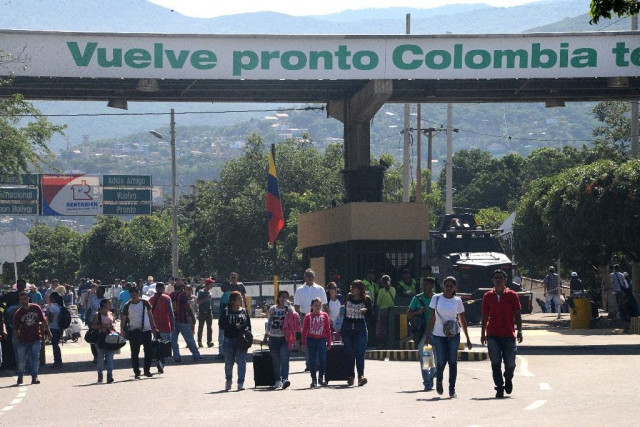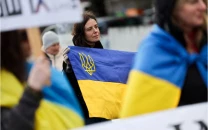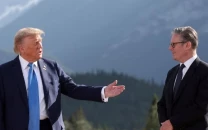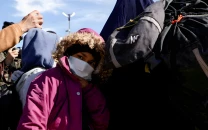Venezuela reopens Colombia, Brazil border crossings
The crossing is open for pedestrians, but only within limited hours for vehicles

PHOTO: AFP
The border with Brazil was also partially reopened, officials in Brasilia said. "Thank God the border is open again," one 29-year-old, Christian Sanchez, told AFP. "A lot of people have come to shop on the other side, because we can't find food, diapers for our babies, medicine."
Sanchez was preparing to enter a pedestrian crossing over the Simon Bolivar Bridge linking the cities of San Antonio in Venezuela and Cucuta, Colombia. But while foot traffic was permitted, trucks carrying needed goods remained blocked.
Bypassing Congress: Maduro decrees Venezuela budget
Venezuela also reopened its main border crossing with Brazil after talks between officials at the Brazilian embassy and Venezuela's foreign ministry, officials in Brasilia said in a statement.
The crossing is open for pedestrians, but only within limited hours for vehicles. Local press reported that some 200 Brazilians, mostly local tourists, were prevented from returning home when Venezuela closed the border.
President Nicolas Maduro had ordered the borders with Colombia and Brazil be closed December 12 as part of a currency reform that involved removing the 100-bolivar note from circulation.
Maduro alleged "mafias" abroad were hoarding the banknotes to try to suffocate the Venezuelan economy. But looting and clashes broke out over the weekend as many people were left without cash. At least three people were reported killed, and around 300 people arrested.
Venezuela's Maduro extends economic emergency measures
Bolivar was hit hardest by the unrest. A curfew has been in force there since Saturday, and more than 3,000 troops are patrolling the streets.
Maduro eventually reversed course and said the currency will remain legal tender until January 2 while new, higher denomination bills are printed and circulated.
Late Monday, he and Colombian President Juan Manuel Santos spoke by telephone and agreed to reopen the border "progressively," according to Venezuelan information minister Ernesto Villegas.
While visiting the border town of Cucuta on Tuesday, Santos said in a televised speech that better cooperation "on both sides" was needed to crack down on contraband.
Venezuela is in the grip of a dire economic crisis spurred by low prices for oil - the country's main export.
Pakistan’s trade with Brazil exposes country’s weaknesses
It is in its third year of recession and suffers the highest inflation in the world, which the IMF forecast could hit 475 percent this year.
Maduro blames outside forces -- frequently evoking a US "plot" -- for the severe downturn. But analysts say currency controls and government policies have aggravated the situation.
With the Colombian border seen as a lifeline for many Venezuelans struggling to make ends meet, long lines formed hours ahead of its reopening.
Marta Cardenas, a 51-year-old Colombian living in Venezuela, said the reopening was a "breath of fresh air" amid mounting daily problems, made worse with the shortage of cash.



















COMMENTS
Comments are moderated and generally will be posted if they are on-topic and not abusive.
For more information, please see our Comments FAQ